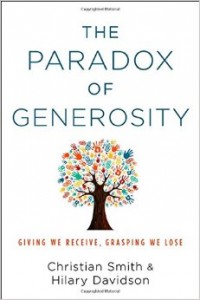Do you sometimes wish for empirical evidence to back up your faith claims? In The Paradox of Generosity (Oxford University Press, 2014), sociologists Christian Smith and Hillary Davidson provide compelling social-scientific evidence suggesting that generosity leads to a happier, healthier, more purposeful life, confirming Jesus’ teaching that “Those who find their life will lose it, and those who lose their life for my sake will find it.” (Matt 10:39)
Practices of generosity are “positively and significantly” associated with five important outcomes — greater personal happiness, physical health, a sense of life purpose, avoidance of depression, and personal growth.
Smith and Davidson examine a number of generous behaviors including financial giving, volunteering, relational generosity (giving time, attention, and emotional energy to others), and neighborly generosity (being hospitable and helpful to others). They conclude all these practices of generosity are “positively and significantly” associated with five important outcomes — greater personal happiness, physical health, a sense of life purpose, avoidance of depression, and personal growth.
And if you find yourself wondering whether it’s generosity that leads to well-being or well-being that leads to generosity, the authors devote an entire chapter to the question of causality. While acknowledging that generosity and well-being reinforce each other in complex and interactive ways, they maintain that “the association … is not an artifact of reverse causal influence. Certain well-known, explicable causal mechanisms explain the specific ways that generous practices shape positive well-being outcomes.” Indeed, they present social-scientific evidence to support the following nine specific causal mechanisms.
- Generosity fosters positive emotions that promote happiness and health.
- Generosity triggers the chemical systems in our brains that reduce stress and suppress pain.
- Generosity promotes our sense of personal agency and self-efficacy.
- Generosity provides us with positive, meaningful social roles and self-identities.
- Generosity reduces our tendency toward maladaptive self-absorption.
- Generosity reinforces our perception of abundance and blessing.
- Generosity expands our social networks and relational ties.
- Generosity expands our intellectual and emotional horizons by exposing us to the needs of others.
- Generosity is associated with a more active lifestyle.
Practice Makes Perfect
Interestingly, there is a caveat in the otherwise consistent relationship between various forms of generous behavior and positive personal outcomes. Some acts, such as designating a large financial bequest through one’s will or signing up as an organ donor, are extremely generous; yet they do not produce the specific positive outcomes associated with other forms of generosity. The authors’ explanation for this discrepancy is that these forms of generosity involve a single generous act rather than a repeated pattern of action. It seems that the positive benefits of generosity flow from ongoing behaviors that involve recurrent intention and attention. To put this in spiritual terms, generosity is a spiritual practice that forms us — a tool that God uses to shape our hearts.
The Paradox of Generosity
The book’s title, The Paradox of Generosity, alludes to a two-fold paradox. First is the simple, ironic truth that it is by giving that we receive. This is good news. The troubling aspect of the paradox is that despite the benefits of generosity, very few Americans reap the positive outcomes because they fail to embrace the generous lifestyle. Christian Smith (with coauthors Michael Smith and Patricia Snell) exposed this grim reality in his earlier book, Passing the Plate: Why American Christians Don’t Give Away More Money (Oxford University  Press, 2008). [See “Giving Up to Our Potential”, Leading Ideas April 15, 2009.] It seems that those of us who proclaim the Good News have our work cut out for us in helping more people embrace a generous lifestyle.
Press, 2008). [See “Giving Up to Our Potential”, Leading Ideas April 15, 2009.] It seems that those of us who proclaim the Good News have our work cut out for us in helping more people embrace a generous lifestyle.
The Promise of Biblical Generosity
The call to Biblical generosity is an invitation to step beyond the destructive lure of consumerism and self-gratification into a transformative way of life that counteracts greed and selfishness and brings forth true abundance. The Paradox of Generosity documents what our theology of stewardship teaches. It is an enormously helpful and hopeful work.
The Paradox of Generosity (Oxford University Press, 2014) is available through Amazon or Cokesbury.
Related Resources:
- Giving Up to Our Potential by Ann A. Michel
- Nine Ways of Viewing Faith and Money by Ann A. Michel
- Spending More on Others Fosters Increased Generosity by Laura Heikes
- Theology of Stewardship and Biblical Generosity Resource






